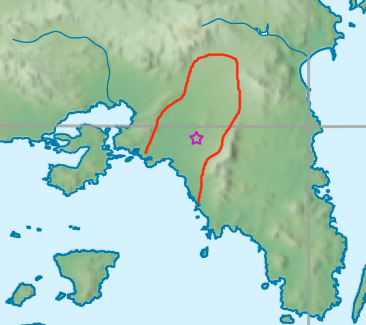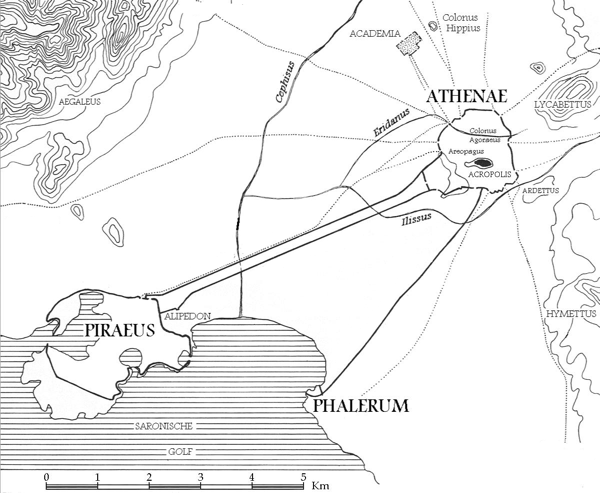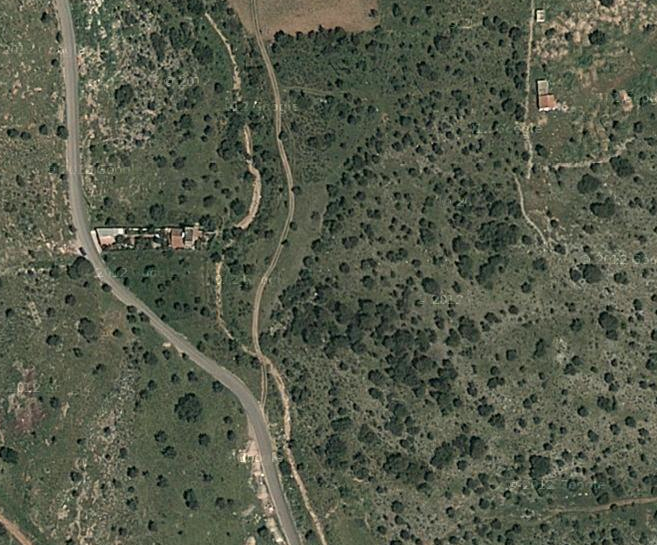As far as we can tell, there has been some sort of settlement at Athens as far back as history and archaeology can take us. The site was perfect for even the smallest village: an oblong valley about ten miles wide with an impregnable hill, the Acropolis, in the center:

Indeed, “Acropolis” means “high town”; it is likely that the first settlers established their homes on top of that hill, with farmland at its base. This was likely the situation throughout the Bronze Age, lasting up until about 1200 BCE. When Mycenaean civilization collapsed at that time, Athens probably shrank in size but never disappeared. Slowly, it began to recover and expand. It never came close to filling its valley until modern times; at the height of its power around 400 BCE, it looked like this:

The land around Athens was farmland, but it wasn’t very good as farmland; I doubt that they could grow much wheat or other cereals on it. Here’s a modern-day aerial photograph of some open land in the valley.:

This is not the kind of land you grow luxuriant crops on; it’s dry and rocky, fit only for growing olives and grapes. It’s likely that there was a little bit of good land on either side of the three rivers shown in the black and white map: the Cephisus, the Eridanus, and the Ilissus. But these were more like creeks than rivers, and I doubt that they flowed during the summer. I’d guess that the total amount of land along these creeks that could bear crops was maybe a few hundred acres. That’s enough to support a little village, but nowhere near enough to support a town, much less a city like Athens.
So how did Athens support its population? My guess is that, at the end of the Bronze Age when every little town was thrown back on its own resources, the population shrank to what could be supported by the pittance of farmland in the valley. Ownership of farmland was the decisive factor in survival; families with good land hung on, families without good land petered out. When the population bottomed out, it consisted solely of landowners who governed themselves in a roughly democratic fashion, although there weren’t many of them; probably less than a thousand people in toto.
There was also a small population of fishermen living on the Piraeus, the little peninsula southwest of Athens. In those days, the difference between a fisherman and a pirate was academic; you did whatever it took to stay alive, and if that meant pillaging nearby fishing villages, that’s what you did. This kept the population of fisherman small. But the near-perfect harbor insured that there’d always be some fishermen eking out a living there.
Sparta
Meanwhile, in southern Greece lay a long valley watered by the Eurotas River. This valley is both larger and more fertile than the land around Athens. It’s 50 miles long by 15 miles wide. Here’s an aerial photo of the farmland in this valley:
Granted, it’s still orchards, but look how much lusher the land is. This is good farmland. In ancient times, the climate in Greece was somewhat wetter than it is today, so the land could easily support large farms growing lots of wheat. This valley also had a ruling city: Sparta.
The Economic Revolution
Starting around 1000 BCE a change began that had momentous implications for human history. It happened all over Greece, but was most pronounced in Athens. That change was simple: landowners began planting grapevines to make wine and olive trees to make olive oil. They didn’t have any excess cereals to trade with, but they could trade wine and olive oil for fish from the local fishing community. This improved the food supply for both the Athenians and the local fishermen. Fish provide great protein but not so many calories, while olive oil and wine both provide plenty of calories. Separately, their diets weren’t that healthy, but together, they had a winning combination, and their populations grew. Their connection became so strong that they eventually merged, with the greater population of Athens supplying some military resource to fend off pirates.
The arrangement was a virtuous circle: more food meant more people which meant more fishermen and more laborers to work the land, so the population grew rapidly. The political structure was the same as the structure in every other agricultural civilization: the landowners ran the show, and the landless worked the land and got the short end of the economic stick. Basically, it was the aristocracy and the demos (the people). Every other civilization with this structure struggled with the conflict this engendered between the affluent aristocracy and the numerous workers. To defend their dominance, aristocracies became increasingly militaristic in tenor; sometimes they ruled as an oligarchy; sometimes they would select one of their own as king so that they could respond instantly to any uprising.
This was the standard system used all over the world, and it worked. But as Athens grew, the economics slowly shifted. The population outstripped the meager capacity of the land to produce wheat, and the three other components of the Athenian diet (fish, wine, and olive oil) weren’t sufficient to support a growing population. There was only one solution: Athens had to import wheat. This in itself wasn’t difficult; their fishing population could easily handle extra trading, and their wine and olive oil were valuable. A completely new class arose: the merchants. These people were independent of the aristocracy because their basic source of wealth was the capital investment in their boats. They didn’t need no stinkin’ land. The profits from trade accrued to them, not the aristocracy.
Anywhere else, the aristocracy would use its military resources to rob the merchants of their wealth through taxes. I’m sure they tried that in Athens. If and when they did, the merchants would have responded by sailing away. Athens wasn’t the only city benefitting from this new economic model; all along the Aegean littoral (consisting of Greece in the west, Ionia in the east, and the hundreds of little islands scattered through the Aegean), little towns had learned the same trick and were pushing it for all it was worth. A merchant with a shipload of grain would sail to the port with the best prices; aristocrats all over the area found themselves in a bidding war against each other, which drove down their taxing power, which in turn diminished their overall control of society.
But this didn’t happen in Sparta, because Sparta never needed merchants; it was self-sufficient in wheat. It had plenty of olive trees, lots of grapes, and their own fishermen. Sparta didn’t need anything else, so it never developed any merchant class. Thus, the land-owning aristocracy in Sparta never had to worry about merchants. They used a militaristic system to keep the demos (known in Sparta as helots) under their thumb. The ratio of aristocrats to helots was so low that the entire aristocratic community had to devote itself exclusively to military training; that was the only way they could overpower the vastly greater number of helots.
Sparta managed to grow, but not as fast as the mercantile city-states elsewhere in Greece. Sparta’s growth plan was simple: conquer your neighbors. They steadily expanded their conquests until they had most of the Peloponnesus under their control. They squeezed their subjects for all the wealth they could, using that wealth to expand the population of arms-bearing aristocrats.
The system really blasted off when Greek traders extended their range beyond the Aegean Sea. Greek merchants ranged all over the Mediterranean Sea as well as the Black Sea; they set up trading posts everywhere to collect grain for shipment to Greece. The locals eagerly traded their grain for Greek wine and olive oil, and (as I have written elsewhere), the total effort (in calories) required to make and ship olive oil and wine was considerably less than the caloric content of the wheat they got for it. This was a highly profitable operation, and the Greek population shot up.
All this happened in the period between 1000 BCE and 800 BCE. By the end of this period, the basic economic pattern had been established: most Greek cities had a wealthy merchant class, a weakening class of land-owning aristocrats, and a large demos of landless laborers. I chose to highlight Athens and Sparta because they represent the two extremes on a scale populated by all the Greek cities. Of all those cities, Athens was most dependent upon food imports, and Sparta was least dependent. Everybody else fell in between these two extremes.
Economics Drives Politics
When Bill Clinton adopted the campaign slogan “It’s the economy, stupid!” he was recognizing the most fundamental fact of politics: the economy drives politics. Thus, as merchants became wealthier, they became more powerful politically, and began to challenge the power of the aristocracy. They joined forces with the demos to chip away at the power of the aristocracy, a process that extended over 500 years. This never happened in Sparta, which remained a monarchy throughout its lifetime as a polity. There were, of course autocrats who seized power and ruled alone in many Greek cities, but they were careful never to call themselves kings and they usually represented a tightly-knit party. Again, Athens was the most extreme case and its history is the most illuminating.
As democracy slowly supplanted oligarchy, an important new grouping of Athenians arose: the citizens. Basically, everybody was a citizen: merchants, aristocrats, and the demos. Well, not quite everybody; women, slaves, foreigners, or people who had been stripped of their citizenship weren’t included. Thus, out of a population of 250,000 around 500 BCE, only 30,000 were citizens.
Theirs was a direct democracy; political decisions were made by a direct vote of all citizens wishing to participate. They’d call a meeting to discuss an issue, speakers would orate, and those present would vote. A minimum of 6,000 yes votes were required to pass any measure.
Democracy Has Strange Effects
In Athens democracy did not replace oligarchy in a single revolution; instead, it crept in on little cat feet, slowly taking more and more power. This gave the Athenians time to learn from their mistakes and improve their system. Direct democracy created a new force in Greek politics: rhetoric, the art of convincing oratory. People who had a way with words could sway the audience and win the vote. There arose a demand for such people to teach their skills to ambitious young men. If you wanted to get ahead in the world, you needed to be able to convince people that you were right. So a new profession developed: the rhetoricians. These fellows trained students how to give powerful speeches.
The debates in the public assembly were unprecedented in human history; never before had such large groups deliberated together, and never before had provisions for extended speechmaking permitted the presentation of complex arguments. Generation after generation of Athenians debated thousands of issues, and slowly Athens as a community developed a sense of what makes a solid argument and what is merely hot air.
I have previously written that mercantilism promotes rationalism: the brutal logic of the marketplace teaches you to think carefully before you act, and those who indulge their emotions quickly lose their shirts. The merchant class of Athens already had a strong sense of rationalism. The rise of rhetoric instilled this value in the political class, because the best way to convince people that you’re right is to present logical arguments.
I realize that observers of modern American political discourse will ridicule my claim that logical thinking plays an important role in political decision-making. However, I remind you of a crucial difference between Athenian political discourse and American political discourse: the Athenian discourse was interactive, while American political discourse is one-way. It’s easy to get away with lies when you’re talking to a camera, but the kind of behavior we see on Fox News would be quickly demolished if practiced in an open forum.
It’s true that demagoguery can definitely rouse the rabble – witness the trial of Socrates – but the Athenians had hundreds of years to suffer from the flaws of such demagoguery and learn their lessons. Although they had their share of idiots, the general run of citizens were reasonably rational. If you read Plato’s narrative of the trial of Socrates, it’s obvious that his defense was logically quite sophisticated. It may not have convinced enough people to save his life, but the fact that he argued in so rigorous a fashion demonstrates that he expected a goodly number of citizens to understand his points.
So now I’m not so sure about the relative importance of mercantilism and democracy in inbueing a culture with a sense for rational thinking. More on this in another essay.
Map | Index | Bibliography | Sources
